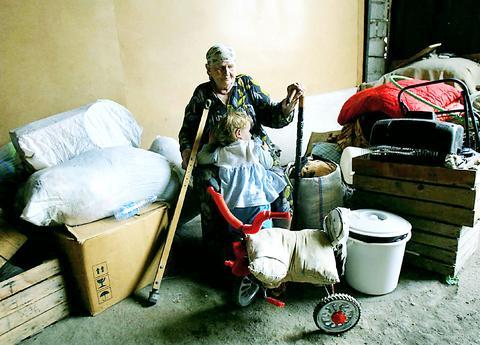A woman from Chechnya, an invalid, sat by a mound of dirty possessions, her three grandchildren wandering in the dust nearby. Their refugee camp was emptying, but they were too poor to buy a ride on the trucks hurriedly heading out of here.
"I have been packed and waiting for three days," said the woman, Manzha Yansuyeva, 78. "I am hoping someone will pity us and help us move."
Following raids by Islamic guerrillas the night of June 21 in the southern Russian republic of Ingushetia, Chechen refugees are in motion once more, saying they are being blamed for the guerrillas' success and must leave or face retaliation in the night. They are deeply afraid.

PHOTOS: NY TIMES NEWS SERVICE
The guerrillas overran police stations and checkpoints here early last week, and, dressed in police uniforms themselves, systematically executed law enforcement and military personnel who tried to come to their besieged friends' aid. Nearly 100 people died before the guerrillas withdrew.
In the days since, Russian and Ingush police, wearing ski masks and carrying assault rifles, have accused Chechen refugees of assisting and sheltering the guerrillas.
They have been rounding up Chechen men for questioning and, the refugees say, for beatings.
Thousands of Chechens are heeding what they regard as an implicit message, now fleeing Ingushetia for Grozny, Chechnya's capital.
"We haven't slept for days already," said Yakhita Dzhabrailova, 57.
Grozny hardly invites. Having suffered two wars in a decade, the city is in ruins, occupied by the Russian Army and controlled by grim-faced armed men whose affiliation is rarely clear.
Civilians frequently disappear, seized in what human rights organizations and local residents describe as a mix of kidnappings for ransoms and violence against residents accused of supporting, even knowing, the guerrillas.
A cornerstone of President Vladimir Putin's effort to convince the world that Chechnya has been stabilizing has rested on Chechen refugees returning home.
During the height of the second Chechen war, more than 100,000 Chechens sought refuge on Ingush soil; the Kremlin had hoped that coaxing them home would demonstrate security and hope. But tens of thousands of refugees had not complied with Moscow's wish, choosing a suspended state of poverty and grief in Ingushetia over lingering horrors in Chechnya.
It took the outbreak of violence in Ingushetia -- an expansion of terror, not a reduction -- to put them to motion.

James Watson — the Nobel laureate co-credited with the pivotal discovery of DNA’s double-helix structure, but whose career was later tainted by his repeated racist remarks — has died, his former lab said on Friday. He was 97. The eminent biologist died on Thursday in hospice care on Long Island in New York, announced the Cold Spring Harbor Laboratory, where he was based for much of his career. Watson became among the 20th century’s most storied scientists for his 1953 breakthrough discovery of the double helix with researcher partner Francis Crick. Along with Crick and Maurice Wilkins, he shared the

OUTRAGE: The former strongman was accused of corruption and responsibility for the killings of hundreds of thousands of political opponents during his time in office Indonesia yesterday awarded the title of national hero to late president Suharto, provoking outrage from rights groups who said the move was an attempt to whitewash decades of human rights abuses and corruption that took place during his 32 years in power. Suharto was a US ally during the Cold War who presided over decades of authoritarian rule, during which up to 1 million political opponents were killed, until he was toppled by protests in 1998. He was one of 10 people recognized by Indonesian President Prabowo Subianto in a televised ceremony held at the presidential palace in Jakarta to mark National

US President Donald Trump handed Hungarian Prime Minister Viktor Orban a one-year exemption from sanctions for buying Russian oil and gas after the close right-wing allies held a chummy White House meeting on Friday. Trump slapped sanctions on Moscow’s two largest oil companies last month after losing patience with Russian President Vladimir Putin over his refusal to end the nearly four-year-old invasion of Ukraine. However, while Trump has pushed other European countries to stop buying oil that he says funds Moscow’s war machine, Orban used his first trip to the White House since Trump’s return to power to push for

LANDMARK: After first meeting Trump in Riyadh in May, al-Sharaa’s visit to the White House today would be the first by a Syrian leader since the country’s independence Syrian President Ahmed al-Sharaa arrived in the US on Saturday for a landmark official visit, his country’s state news agency SANA reported, a day after Washington removed him from a terrorism blacklist. Sharaa, whose rebel forces ousted long-time former Syrian president Bashar al-Assad late last year, is due to meet US President Donald Trump at the White House today. It is the first such visit by a Syrian president since the country’s independence in 1946, according to analysts. The interim leader met Trump for the first time in Riyadh during the US president’s regional tour in May. US envoy to Syria Tom Barrack earlier